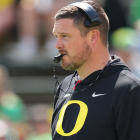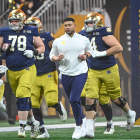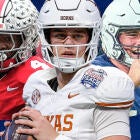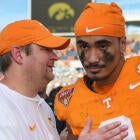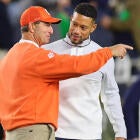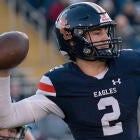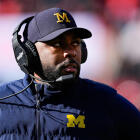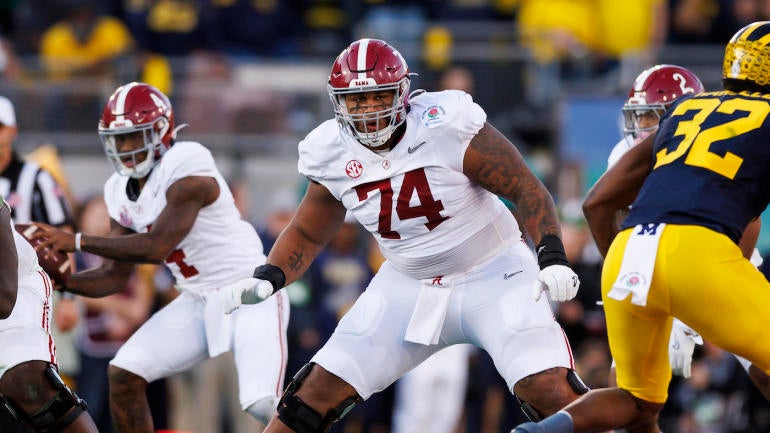
The story of Kadyn Proctor is complicated. Really complicated.
During the same season in which the Alabama left tackle tied for the nation's lead in sacks surrendered (12), he was also a Freshman All-American. A player judged the best offensive lineman from conference championship weekend, according to Pro Football Focus, was also homesick. A dominant force by any measure, Proctor was also a victim of that great devil of our age: backlash on social media.
Following that up-and-down freshman season at Alabama, Proctor transferred to Iowa ... and then back to Alabama. Movement like that is permitted because chaos reigns supreme across the college sports landscape these days.
The NCAA recently formalized an injunction allowing players to transfer multiple times without having to sit out a year. The 6-foot-8, 320-pound Proctor transferred twice in three months -- first in January during the initial postseason portal window and then again after the spring window opened on April 16.
No matter how you view the path taken, the upstanding human being and athlete from Des Moines, Iowa, deserves our sympathy and respect.
"Kadyn Proctor is a generational talent," said Jon Cochran, Proctor's offensive line coach at Southeast Polk High School. "I'm not sure the state will ever see anyone of his size and athleticism again."
Proctor also serves as a symbol of these rapidly changing times, whether he likes it or not. There's transfer freedom, but then there are the possibilities to which Proctor's migration could lead. Examining his situation, are we a lawsuit away from athletes playing for two schools in the same semester?
Given the litigious nature of major college athletic athletics, what happened with Proctor portends even more transfer freedom that could have your head spinning. One of the few NCAA transfer rules still standing says that a player cannot compete for two teams in the same championship season.
That's why Proctor is still believed to be enrolled at Iowa while his heart is back at Alabama. He has to finish his academic semester in Iowa City before venturing back to Tuscaloosa. But, given the current climate, are we one court action away from players being able to just change teams in mid-semester?
"Such a lawsuit is definitely a modern-day possibility," said Joshua Lens, assistant professor at Arkansas with extensive NCAA compliance experience.
It's already a given courts have overshadowed NCAA academic initiatives. All it would take is one enterprising attorney, of which there seem to be plenty in this space.
"This is where we are. We've already seen it," one Power Four official concluded.
For whatever reasons, courts seem more sympathetic to athletes regarding NCAA matters. Start with Alston v. NCAA, which forced the association's hand on name, image and likeness.
Manhattan basketball guard DeJuan Clayton recently received an eighth year of eligibility during a game against Marist. Rutgers was able to welcome Iowa State transfer Jeremiah Williams after sitting 20 games due to gambling violations and getting a favorable court ruling.
Outside of athletic competition, it's sometimes possible for the average student to switch schools in the same semester.
That's what these lawsuits have become about: Is the same benefit available to the average student? Such moves might be even easier in the quarter system as opposed to semesters, which is more of a West Coast phenomenon mattering at places like Oregon, Washington, USC and Stanford.
That's getting away from Proctor's story, though. It was only two years ago the NCAA mandated a player seeking multiple transfers "document a personal need for medical or safety reasons to depart from the previous school."
Now, all that's required of a player to transfer is a desire to try something new. Proctor did, twice in 90 days while bouncing back to his original school.
"Getting adjusted from playing Iowa high school football [and] jumping straight into SEC football against bigger, stronger, faster dudes. That was a big part," Proctor told CBS Sports at the Rose Bowl while still at Alabama. "[It was] definitely the confidence. I didn't have the confidence that I did in high school, when I could go out there, drink a Dr. Pepper, go out to the game and win some reps, win state championships.
"It wasn't that easy. I had to get adjusted to it."
Proctor leaving Iowa out of high school -- after first committing to the Hawkeyes before flipping to the Crimson Tide on National Signing Day -- was the initial upset. Doing it twice was landmark. If his situation is a glimpse into the transfer future, then watch the heck out. We're just getting started.
"You can't count on anything basically until guys get out there [on the field]," Iowa coach Kirk Ferentz said.
Way back when, 130 years ago, one of the Big Ten's founding principles was to crack down on so-called "ringers" playing for multiple schools without even being enrolled.
Tramp athletes -- young men who prefer to travel from college to college, trading upon their athletic ability, rather than to sweat at a more gainful occupation -- still exist.
That was written in the Cambridge Sentinel in 1936.
The concept of the "tramp athlete" actually goes back to the 1890s. Seven of the 11 players on the 1893 Michigan team were not enrolled. Michigan coaching legend Fielding Yost once left West Virginia in his final year as a player to suit up for Lafayette in an upset win over Penn. He then returned to the Mountaineers.
Sound familiar?
No one is calling Proctor a "tramp athlete." He is a bright, young student and prospect finding his future, personality and self.
"Everybody has given up a sack," said a now more settled Proctor. "Everybody has been hated on."
He knows whatever he has/will become has taken a village. After a disastrous Alabama result in a Week 2 loss to Texas last season, Proctor and the rest of the Crimson Tide gradually improved. Proctor cited former Alabama coach Eric Wolford, now at Kentucky, and quarterback Jalen Milroe as influences.
"There wasn't a moment," Proctor said. "It kind of just clicked after the first 3-4 games when I really wasn't having fun, letting up sacks. I was like, 'I can't do this anymore. I don't want to do this anymore. I want to provide for my team.' "
Cochran provided a glimpse of what Proctor went through. Now 40, Cochran knows just about everything there is about playing the position. Like Proctor, he grew up in Iowa. His father was an offensive line coach at Des Moines Valley High School for 36 years. Cochran played at a high level at Stanford from 2003-06 while pursuing a public policy degree.
"Walking into my redshirt freshman year, it was tough sledding," Cochran said. "I tell our guys, 'You're playing grown-man football now. My first start was at BYU playing against a D-end that decided to take his mission with the Church of Latter-Day Saints and was married with two kids. Here I am, a 19-year-old. It is grown-man football in a hurry."
Cochran says the current transfer landscape "is completely foreign to me."
"When I played, you made a commitment and stuck with it for the most part," he said. "Also, I get the struggles these college coaches are having not only having to recruit these players to come their schools but having to recruiting them to keep them there."
That begs the question: Where would Proctor be without the transfer portal? It has allowed him to not only clear his mind but change it as well.
"To be honest with you, I don't know what would have happened," Cochran said. "The perspective I was able to give him when he first got down to Alabama is that leaving the state of Iowa [was] quite a ways from home. Stanford was 1,800 miles away from where I went to high school. It wasn't easy. There was a creeping thought in my mind, 'Was I too far?' "
That question is answered on a case-by-case basis. This one is tougher: How does a kid who seems like he was born to play for Iowa end up at Alabama in the first place? Actually, how does that happen twice?
The simple answer might be that despite the legendary Nick Saban retiring, this is still Alabama.
"It's scary what his ceiling could be," Cochran said. "I can see him potentially being one of the best tackles and offensive linemen in the country."
The deeper answer is, well, complicated.
"I really don't know," Proctor said. "It's rare, but I'm just blessed just to have my size and ability."
![[object Object] Logo](https://sportshub.cbsistatic.com/i/2020/04/22/e9ceb731-8b3f-4c60-98fe-090ab66a2997/screen-shot-2020-04-22-at-11-04-56-am.png)









